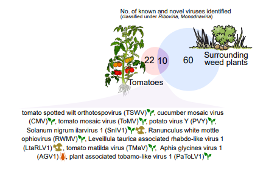In-depth study of tomato and weed viromes reveals undiscovered plant virus diversity in an agroecosystem
Rivarez, M. P. S., Pecman, A., Bačnik, K., Maksimović Carvalho Ferreira, O., Vučurović, A., Seljak, G., Mehle, N., Gutiérrez-Aguirre, I., Ravnikar, M., & Kutnjak, D. (2022). In-depth study of tomato and weed viromes reveals undiscovered plant virus diversity in an agroecosystem. BioRxiv, 2022.06.30.498278. https://doi.org/10.1101/2022.06.30.498278 In this comprehensive virome study of tomato agroecosystems in Slovenia, we have investigated presence of viruses in tomatoes and weeds and discovered a high amount of virus diversity in these two sample types. Most strikingly, a high amount of previously unknown viruses were detected in wild plant species (“weeds”) that surrounded tomato farming sites.
- 30 January 2023
- Yolanda Hernando Saiz
- < back to blog index
We detected 125 viruses, including 79 novel species, wherein 65 were found exclusively in weeds. This spanned 21 higher-level plant virus taxa dominated by Potyviridae, Rhabdoviridae, and Tombusviridae. We detected viruses of non-plant hosts and viroid-like sequences, and demonstrated infectivity of a novel tobamovirus in plants of Solanaceae family.This shows that even in relatively well studied agroecosystems, such as tomato farms, a large part of very diverse plant viromes can still be unknown and is mostly present in understudied non-crop plants. The overlapping presence of viruses in tomatoes and weeds implicate possible presence of virus reservoir and possible exchange between the weed and crop compartments. The extensive insights we generated from such in-depth agroecosystem virome exploration will be valuable in anticipating possible emergences of plant virus diseases, and would serve as baseline for further post-discovery characterization studies.

< back to blog index
Recent posts
- Carrot populations in France and Spain host a complex virome rich in previously uncharacterized viruses
- VIROME ANALYSIS OF IRRIGATION WATER SOURCES PROVIDES EXTENSIVE INSIGHTS INTO THE DIVERSITY AND DISTRIBUTION OF PLANT VIRUSES IN AGROECOSYSTEMS
- Round table: https://youtu.be/XPYOCrXqqOQ
- Managing the deluge of newly discovered plant viruses and viroids: an optimized scientific and regulatory framework for their characterization and risk analysis
- A new flavi-like virus identified in populations of wild carrot
- Tomato brown rugose fruit virus in aqueous environments – survival and significance of water-mediated transmission
- First report of carrot torrado virus 1 (CaTV1) naturally infecting carrots in Spain
- VirHunter: A Deep Learning-Based Method for Detection of Novel RNA Viruses in Plant Sequencing Data
- Diversity of polerovirus-associated RNAs in the virome of wild carrots
- First report of Apium virus Y in wild carrot (Daucus carota ssp. carota) in Spain
- Tobamoviruses show broad host ranges and little genetic diversity among four habitat types of a heterogeneous ecosystem.
- Metagenomics show high spatiotemporal virus diversity and ecological compartmentalisation: virus infections of melon, Cucumis melo, crops and adjacent wild communities
- Web-based roundtable: Adoption and impact of high throughput sequencing in plant health: Seed testing, surveillance and certification
- Identification of two novel putative satellite RNAs with hammerhead structures in the virome of French and Spanish carrot samples
- Diversity and pathobiology of an Ilarvirus unexpectedly detected in diverse plants and global sequencing data
- First Report of Ranunculus White Mottle Ophiovirus in Slovenia in Pepper with Yellow Leaf Curling Symptom and in Tomato
- In-depth study of tomato and weed viromes reveals undiscovered plant virus diversity in an agroecosystem
- THE EXPANDING MENAGERIE OF PRUNUS-INFECTING LUTEOVIRUSES
- Molecular characterization of a new Prunus-infecting cheravirus and complete genome sequence of stocky prune virus
- Genetic differentiation and migration fluxes of viruses from melon crops and crop edge weeds
- Global advances in tomato virome research: current status and the impact of high-throughput sequencing
- Cont-ID: Detection of samples cross-contamination in viral metagenomic data
- Validation of high throughput sequencing as virus indexing test for Musa germplasm: performance criteria evaluation and contamination monitoring using an alien control
- HIGH THROUGHPUT SEQUENCING TECHNOLOGIES COMPLEMENTED BY GROWER’S PERCEPTION HIGHLIGHT THE IMPACT OF TOMATO VIROME IN DIVERSIFIED VEGETABLE FARMS
- BIOLOGICAL AND GENETIC CHARACTERIZATION OF PHYSOSTEGIA CHLOROTIC MOTTLE VIRUS IN EUROPE BASED ON HOST RANGE, LOCATION, AND TIME
- Risk perception associated with an emerging agri-food risk in Europe: plant viruses in agriculture
- First reports of Apple luteovirus 1, Apple rubodvirus 1 and Apple hammerhead viroid infecting apples in Belgium
- Evaluation of Methods and Processing for Robust Monitoring of SARS-CoV-2 in Wastewater
- Importance of associated weeds and cropping systems in shaping the viromes of horticultural crops. Ayoub Maachi PhD Thesis
- Use of high throughput sequencing and two RNA input methods to identify viruses infecting tomato crops.
- Complete genome sequence of malva-associated soymovirus 1: a novel virus infecting common mallow
- Cohombrillo-associated virus: a novel virus infecting Ecballium elaterium plants
- Known and new viruses identified in the virome of crops scanned by INEXTVIR
- Scanning the virome of Prunus : Identification and characterization of novel luteoviruses and Secoviridae members
- Complete genome sequence of almond luteovirus 1, a novel luteovirus species infecting almond
- INEXTVIR Mid-Term Check + Network Meeting 2 + School 2